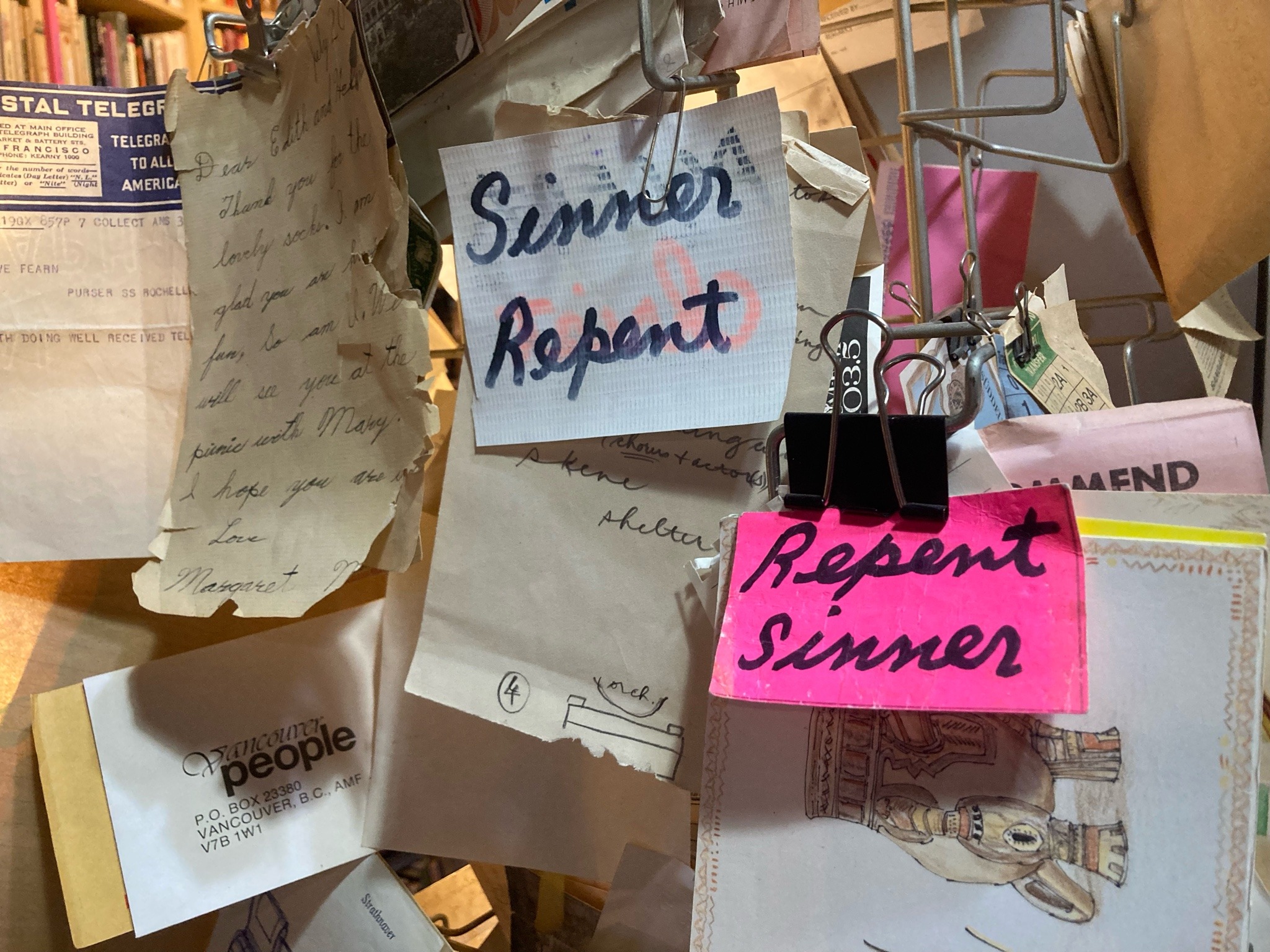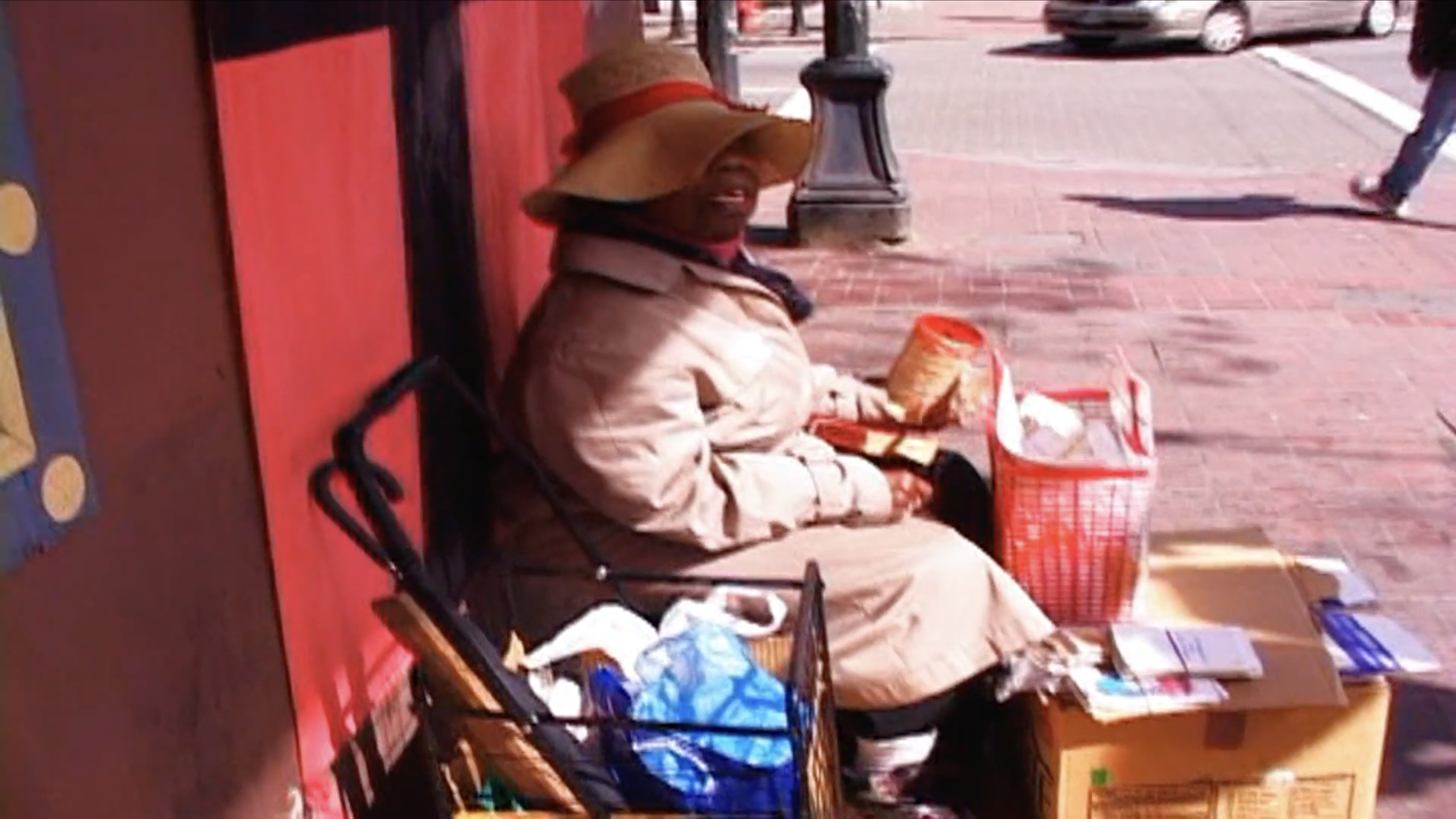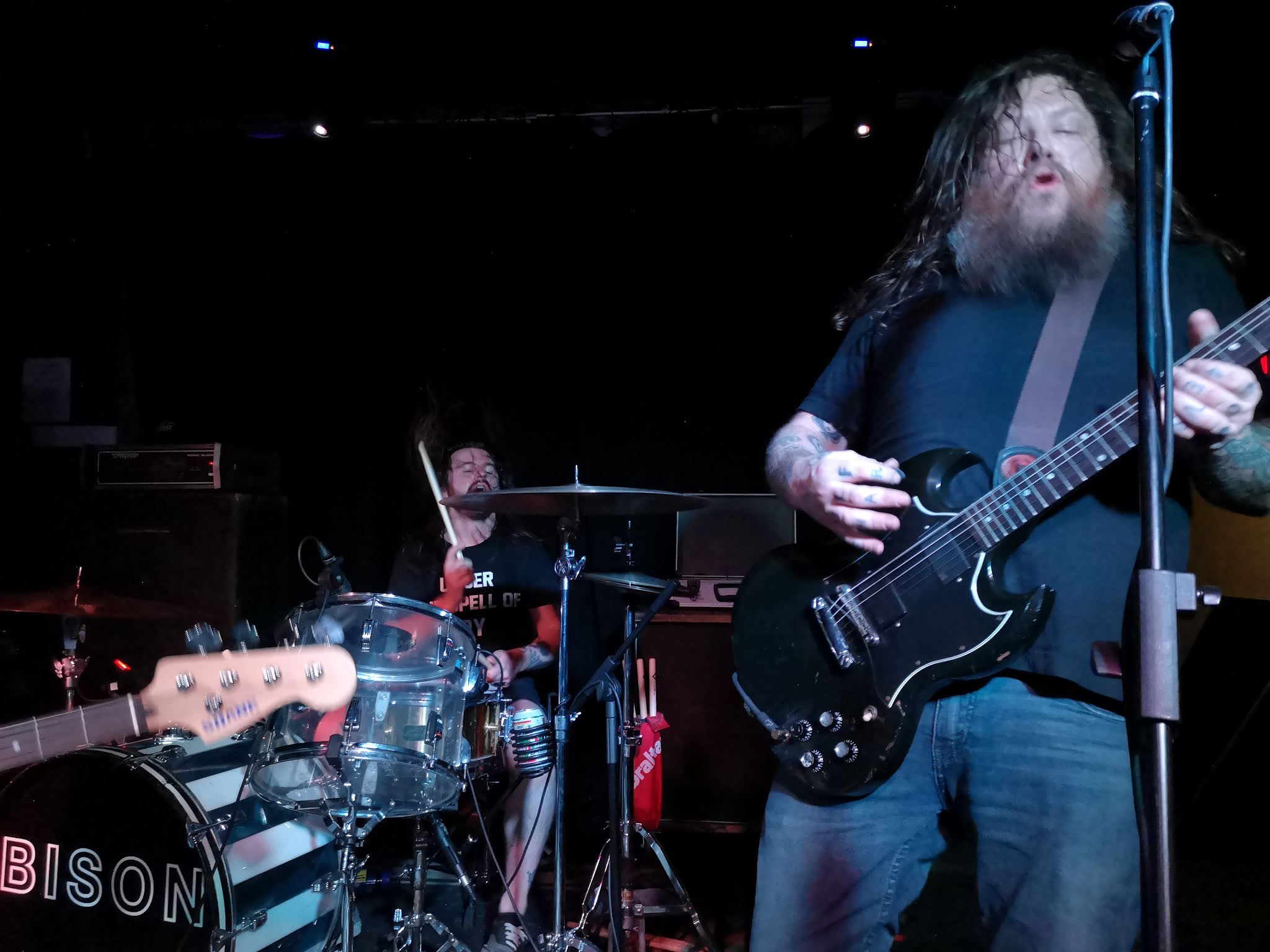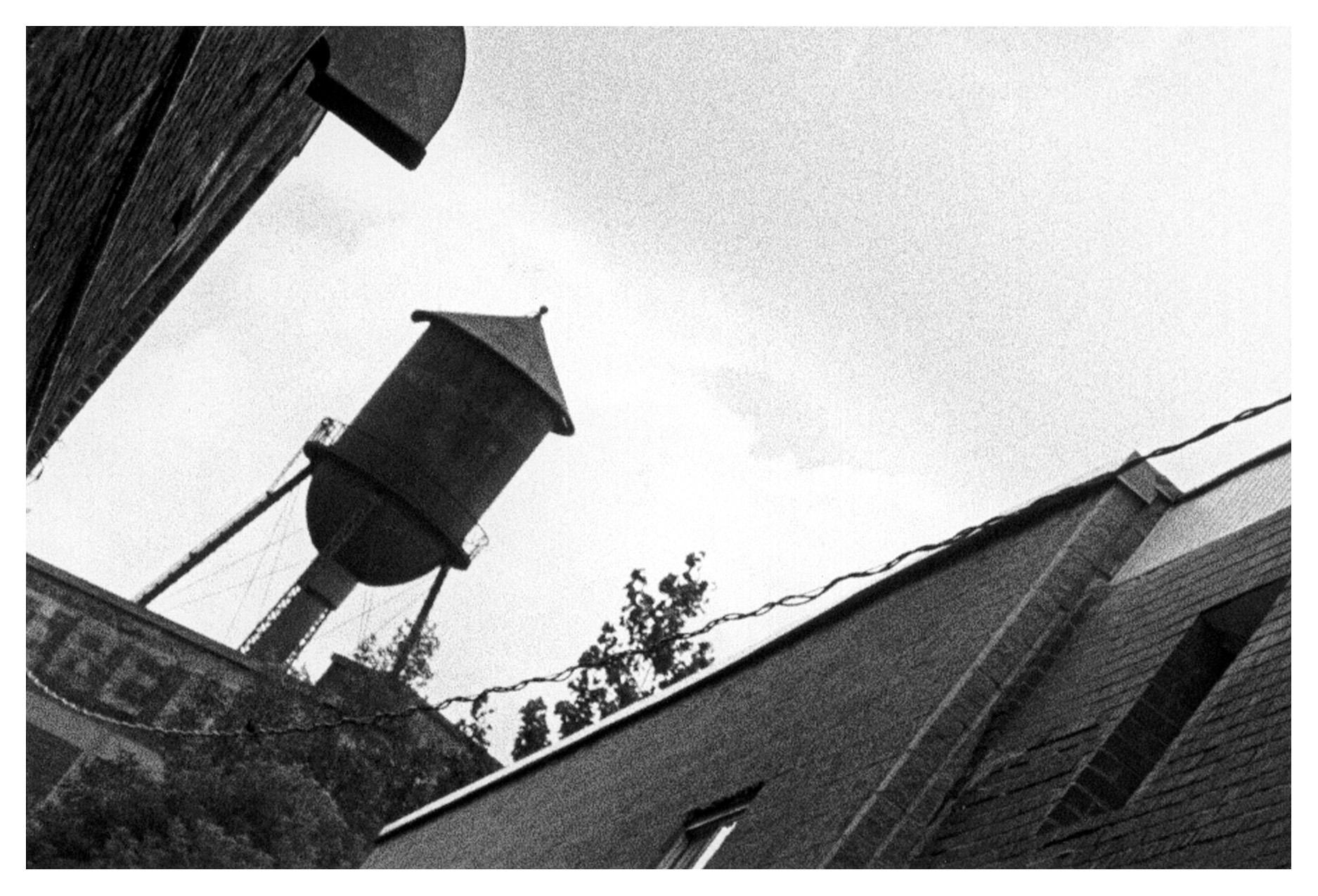There’s a remarkable, brief sermon—an apparent field recording—that begins the song “East Hastings” by Godspeed You! Black Emperor on the band’s 1997 debut LP, F♯ A♯ ∞ (pronounced “F-sharp A-sharp infinity”). Set to mournful bagpipes, a Caribbean street preacher testifies that “No matter what we have, no matter the money, no matter the riches of the world, it cannot buy what we want.… What we need is the love of Jesus Christ.”
Anyone who spent time on the titular street in the late 1980s and early ’90s will likely recognize the person speaking. She distributed flyers from a basket labelled “Repent Sinner,” a slogan also emblazoned on cards distributed around the city at the time—but more relevantly, for many years, both before and after Woodward’s closed in 1993, she used to sit outside the building and spread the word of God. Online sources say she died around 2005.

Handwritten “Repent Sinner” flyers are included in an archive of similar local history materials at the Paper Hound Bookstore. Photo by Kim Koch of the Paper Hound.
So who was she?
Exu Nazares of the band The Technicians Of The Sacred remembers her well. Along with the local singer Cass King and their friend Zane, Nazares ran a space on East Hastings called Ashé Gallery, which held art events upstairs, hosted kink parties put on by the Bettie Page Social Club, and had elaborate altars to Afro-Brazilian deities downstairs in the “voodoo electric underground,” as Nazares calls it.
Calling himself MC Exu—playing on both the name M.C. Escher and his occasional rap performances—Nazares would see the woman on East Hastings, “preaching damnation and hellfire. One day we decided to talk to her.” He and Cass King “had been discussing which orisha [spirit] might be possessing her and decided it was probably Oggun, because of her tunnel vision preaching and harsh words. When we finally asked her what her name was, she said Imogen—it sounded like she said ‘I’m Oggun.’ After that we would say hi to her when we saw her. She was very abrupt with her answers, and her eyes would roll back as she shouted out verses from the Old Testament.”
Neither Nazares nor King has photos of Imogen. “I’m half convinced that if anyone tried to take one, she would just show up as a smudge,” King observes. “She was otherworldly.”
Cass remembers that the neighbourhood circa 1994 was an “intense convergence of artists and energy. You could hear Imogen from morning to nightfall, her voice modulating loud and low like a church organ.” She wrote a poem inspired by Imogen, but all she remembers now is the first line: “Hoarse Raven cries in the canyon.” She explains that “that’s what that block was like: a dark, shuttered, urban canyon, teeming with life and creativity under the surface.”
Dana Gingras of The Holy Body Tattoo dance troupe also routinely encountered Imogen en route to the rehearsal studio on Carrall. “Her voice was very much a part of our daily life. This is what brought me to the GY!BE recording for our piece Monumental,” she says. “The only thing I know about her is a very visceral experience which has never left me: One lunchtime, Noam [Gagnon] and I were by the Woodward’s building and witnessed someone take a huge piece of wood with nails in it and hit her across the head. We ran to help her. She was covered in blood, so we called an ambulance. I so distinctly remember holding her in our arms and hearing her heartbeat while we waited for the ambulance to come. She explained that this person came by frequently to steal from her, yet she never moved from that corner.”
The only surviving images of Imogen that I encountered while looking into her history are in the rock video for the Bocephus King song “Jesus the Bookie.” It was assembled around archival footage taken by Odd Squad Productions, a collaboration between local filmmakers and the Vancouver Police Department, including Al Arsenault and Toby Hinton, now retired from the force. Formed to educate people about the dangers of drug use and the conditions in the Downtown Eastside, the Odd Squad most famously shot Through a Blue Lens, a compassionate but harrowing document of daily police work in the neighbourhood.

Images of Imogen are seemingly rare. She appears in the video for the Bocephus King song “Jesus the Bookie,” though her likeness is not especially easy to make out.
Whether it was their having asked permission, their having explained their moral purpose, or the presence of uniformed police, the Odd Squad got a warmer reception from Imogen than the Vancouver musician Jaime Clay (of Private School, Warsaw, and PAZ) did when he attempted to videotape her preaching and was promptly scared away by her reaction. Clay describes her breaking into a tirade that began with religious language—he was “Satan incarnate,” and she was going to dispel him from Earth—to her picking up a rock that was holding down her papers and threatening him with it, cursing him all the while. Similarly hostile altercations were reported and even recorded at times.
Brian Shipper, a civilian producer for the unit, acknowledges that Imogen may have had “issues”—as many would concede about someone who testified all-day-everyday about Jesus on East Hastings Street. But he also remembers her being lucid, friendly, and cooperative, signing a release giving permission for her image to be used. In the surviving clip, she speaks directly about the state of her community: “We need a mighty power of God to move into this city, brother, because the condition is getting worse and worse every day.”
“Jesus the Bookie” was a co-production between Bocephus King and the Odd Squad, Vancouver author and musician Aaron Chapman explains. “I was probably the nexus, because I had been doing some film music and scoring for the Odd Squad, and playing in Bocephus King” around 2004.
Unbeknownst to Chapman, the recordings of Imogen made by Efrim Menuck and David Bryant, guitarists for Godspeed You! Black Emperor, were made roughly 10 years before that, when the two made a cross-country road trip from Montreal to Vancouver, Menuck explains on Zoom from Montreal. They weren’t even sure what they were assembling material for—Menuck had a strong interest in film at the time, as well, and elsewhere on the album he cannibalizes a sample from one of his own unfinished films.
“We spent a few days in Vancouver and spent a few days filming stuff around East Hastings and recording stuff,” Efrim recalls. They heard Imogen testifying from around the corner from where they were standing and broke out a portable audio recorder. They didn’t even see her until after they walked away, he says. “She was just there doing her thing. It’s only later that people told me anything about her,” and they realized she had a presence in the community.
Imogen is, to be sure, not the first person from the neighbourhood who ended up sampled. James Farwell of the Vancouver metal band Bison—who has worked with vulnerable populations along the East Hastings corridor—included a recording of someone having an apparent off-his-meds stream-of-consciousness meltdown on Bison’s song “Calm, Friendly and Euthymic.” But he asked permission to use that material and received it.

James Farwell performs with his band Bison in 2018. Photo by the author.
The case was a bit different with Imogen, Farwell acknowledges: “I understand that she’s spewing it out into the void, so you don’t really have to get permission,” he says. Still, I put the question to Efrim—did they ask?
“No, because it felt like she was putting her words out into the world,” he says, unwittingly echoing Farwell. “She was street preaching, y’know? And also, the odds of her being impacted by this in any way, shape, or form seemed to be almost zero. I felt like we had a sensitivity to that stuff, but I don’t know that we had the words to sort of figure out what the moral line was. You just don’t want to exploit people, and you don’t want to, like, engage in any sort of—these words didn’t exist—but not wanting to engage in any sort of ‘poverty porn’ or whatever. But again, because she was a street preacher, it wasn’t like someone having a mental episode.”
There was abundant other “more confusing” material that they recorded but didn’t use, which mostly ended up being of them being confronted by Downtown Eastside residents and then—with shades of King Crimson’s “Thela Hun Ginjeet”—having to explain why they were recording them. “It’s all tricky. I don’t know—if that happened today, I don’t know that I would use it, but I don’t feel like we exploited her.”
What they did do, however—and I share this with Menuck—was create something extraordinarily moving to at least a few Vancouverites, who do remember Imogen well and are grateful to be participating in this story, which would not have happened without the Godspeed track. And in fact, it was on the basis of the field recording that Keith Parry, the founder of Scratch Records, pulled F♯ A♯ ∞ off the wall when I asked him to recommend something on a visit to his Gastown shop in 1997. “Well, this is a bit weird,” he said, which was not an unusual place for Parry to start, having previously introduced me to Daniel Johnston, Jandek, Sun City Girls, and Merzbow—“but there’s this album by a Montreal band that samples this Caribbean street preacher who used to sit out on East Hastings Street.”
I knew exactly who he meant and bought the album because of her, with no further questions.
And even though, as he explains, he was either high or hungover when he passed her on East Hastings Street, even James Farwell gives her credit and (I think) would be glad her voice lingers on today. “It was a real wild thing to see someone so dedicated to, uh, preaching,” he says to me over a table at LanaLou’s. “Or as I would take it, just yelling out into the ether about some imaginary friend in the sky that would come and help us.”
Obviously no believer, Farwell is still surprisingly respectful of Imogen’s vocation. “Y’know, people can go out and they’re free to do whatever they want. That’s, like, what’s important. She stood there, and no matter what was going on in her life, she was just really adamant about making that statement, and that’s cool. That’s what it’s all about.”
Godspeed You! Black Emperor plays at the Vogue Theatre on May 10 and 11.
Thanks to everyone I bugged in pursuit of this—including Luke Meat, Chris Walter, and any other people I didn’t end up quoting. More can be found in an adjunct article at Alienated in Vancouver.
Read more music stories.









